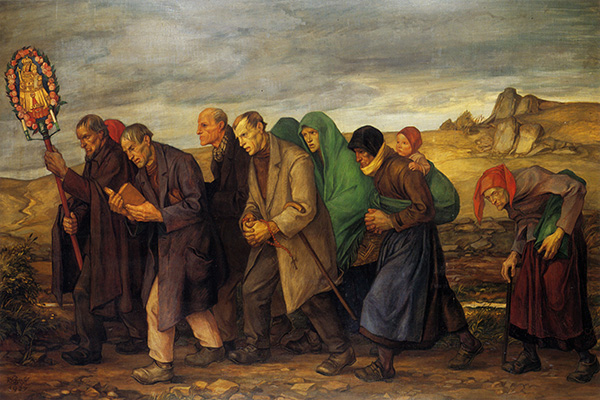
I have a priest friend who regularly mentions people he thinks are holy. Almost everyone he mentions would not be someone I would think of as an exceptionally holy person. Almost as soon as my friend mentions those he thinks of as holy, I catch myself and remind myself that no one knows who is holy, and making such judgments about people is dangerous. When we do make such judgments, it almost seems as though we are playing God. Yet it seems inevitable that we will find some people’s lives more attractive, appealing, virtuous, and, let me write it, holy.
What do we mean by the word holy? From the pulpit on Sundays, I often tell the congregation that everyone present in the congregation is holy though probably none of them would dare to think that they are holy. I usually continue from the pulpit by explaining that I think all who are present have Christ and his Spirit living within them. The very presence of those in the congregation suggests that they have some kind of love relationship with God and that Christ and his Spirit are living within them. By holy I mean that each person, though sinful, is a temple of the Holy Spirit. This does not mean that when they die they will be canonized but it does mean that each person at Mass is holy.
In last week’s column, I suggested that what Marcel meant by “disponibilité,” which might be translated as availability, is how I think of holiness. God is always available to us. There is not a moment in our lives when we are not being invited into a deeper love relationship by the presence of the Holy Spirit, the Spirit of love, in our lives. If we are available, then our relationship with God deepens. I believe, and I think Marcel also believed this, that when we are available to others we can also meet God. So being available to God and to others is a good way to think of holiness in my opinion. If we read the gospels with the notion of being available in our minds then Jesus appears as a most available person, available to his Father, to his disciples, to those he healed, to those he taught, to those who crucified him.
One way of understanding better what Marcel meant by “disponibilité” is understanding what he means by a relationship characterized by having, which seems to be the opposite of “disponibilité” or availability. In his essay on Marcel entitled “From Problem to Mystery” in Commonweal (March 2020), Steven Knepper commented on what Marcel meant by having in interpersonal relationships:
“We can take a stance of ‘having’ toward others, treating them as means to our ends. This can take the form of overt subjugation or exploitation, but it can also be subtle. We can become self -enclosed by egotism, for instance, or we can be habituated into relationships of having through commodification and consumerism.” (p. 21)
I think that Marcel would say that the temptation toward having in our relationships might even extend to our relationship with God. I am thinking of some spiritual practices in which we seem to think, at least implicitly, that we control God. For example, a novena which claims that if a person does certain actions such as prayers every day for nine days, it is guaranteed that the person’s intentions will be granted.
In other words, instead of surrendering to God, we act as though we control God, as though we “have” God under our power. I suspect that if a person’s relationship with God slipped into a relationship of having, Marcel would think that the person no longer had any relationship with God. By reducing God to an object we ‘have”, we lose our relationship with God. This does not mean that God stops loving us but it does mean we are not properly responding to that love.
I think that one of the reasons I am such an enthusiastic fan of Catholic novels is that they often depict and dramatize characters whom in real life we would not think of as saints yet in the novels the authors seem to be suggesting that they might be. What drama could be more exciting than one about salvation or damnation? What story could be more interesting than one about someone’s love affair with God? By depicting sinners as possible saints, the authors can help readers expand their horizons and possibly see sanctity in a fictional character that they might miss in a real person in their life. I am thinking of “the whiskey priest” in “The Power and the Glory,” Sarah in “The End of the Affair,” Sebastian in “Brideshead Revisited,” Scobie in “The Heart of the Matter,” Billy in “Charming Billy,” the apostate priest in “Silence” and many more.
Could holiness be welcoming the presence of God and others into our lives?
Father Lauder is a philosophy professor at St. John’s University, Jamaica. He presents two 15-minute talks from his lecture series on the Catholic Novel, every Tuesday at 9 p.m. on NET-TV.
